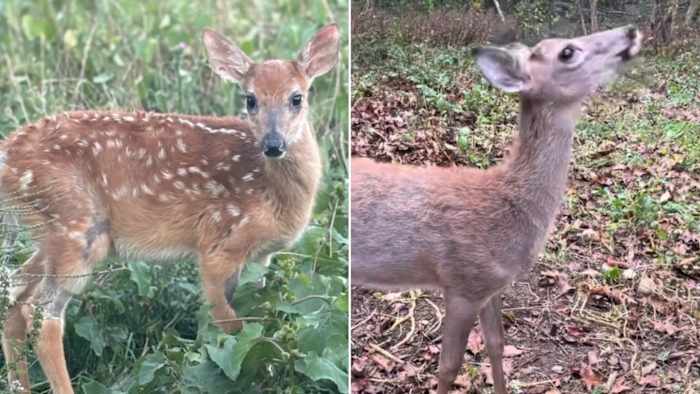DETROIT – A partially blind fawn who was facing euthanasia will instead be allowed to live at a special Michigan facility after she received support from across the state.
“Peanut” has gained the support of many Michiganders after the Detroit Animal Welfare Group posted on Facebook that the fawn faced euthanasia.
“Peanut will soon lose her precious life in vain, despite the fact that she was raised by licensed rehabs and transferred to a licensed facility as an education ambassador,” the post said.
DAWG posted that the Department of Natural Resources required the permit to add Peanut on their education permit had to be submitted by Sept. 15.
On Friday, the Michigan DNR announced it will sign and issue a permit allowing Peanut to be placed at a facility where native, live animals are kept for educational purposes.
The facility in question submitted an official request to the DNR on Thursday afternoon, according to officials.
Normally, fawns have to be released into the wild by Oct. 1 to have time to reacquaint themselves with food sources before winter. But Peanut’s condition doesn’t allow her to be released back into the wild, the DNR confirmed.
“Fawns and other white-tailed deer are native species of wild animals that belong in the wild,” said John Pepin, DNR deputy public information officer. “They aren’t meant to be pets. If they remain in rehab facilities beyond early October and are later released, they won’t be able to survive in the wild over the wintertime.”
In most of those cases, the deer are euthanized as a “humane outcome,” the DNR says. But Peanut is one of the rare cases when a fawn can be kept for educational purposes.
To qualify, animals must have prior approval from the DNR’s Wildlife Division permit specialist and also be examined by a veterinarian.
Peanut’s final report from the veterinarian was received by the DNR on Thursday afternoon. Officials reviewed it and agreed to grant the permit, they said.
For a live animal to be possessed in this manner, if must be permanently injured or non-releasable for another reason. It must also have been legally held and donated by a licensed wildlife rehab spot.
“The plight of this wild fawn has generated tremendous bipartisan support from legislators and people across Michigan and beyond,” Pepin said. “It is encouraging to see so much goodwill directed toward Michigan’s wild animals. This is likely to help ensure support for wildlife conservation and sound wildlife management heading into the future.”
The Michigan DNR also acknowledged that it remains in litigation with DAWG on multiple cases, including the one involving Kota the coyote. Since it’s a pending case, the DNR won’t have any additional comment at this point.
Copyright 2025 by WDIV ClickOnDetroit – All rights reserved.

